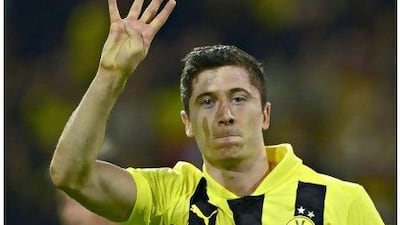Borussia Dortmund are a very modern team. They press hard and high up the pitch, they specialise in quick transitions, they have attacking full-backs who overlap wingers, who cut in, they have a passer-tackler combination at the back of midfield.
If you went through a checklist of tactical trends of the past decade, they would tick most boxes. And yet their centre-forward, arguably their most desirable remaining player now that the sale of Mario Goetze has been confirmed, is in many ways a very old-fashioned player.
Robert Lewandowski is not a false No 9 or even a quasi-false No 9, in the manner of Lionel Messi or Sergio Aguero.
He does not drift out to the flanks like Thierry Henry or Samuel Eto'o, or go foraging back in midfield like Carlos Tevez and Wayne Rooney.
Neither is he a Didier Drogba-style target-man; he is not about muscle or battering defenders physically. In fact, if he recalls anybody, both in terms of physique and style of play, it is Ian Rush.
Lewandowski, now 24, stands 6ft, a little taller than the former Liverpool forward, whose heyday was in the 1980s, but shares with him an angularity – "he has legs like sticks" as a former coach put it. He can hold the ball up, act as a reference for the mobile midfield less because of body weight than through technique, by a positional awareness than involves not merely moving into space, but interceding his body between defenders and the ball.
His wiriness, perhaps, is inherited from his father, a national judo champion, while his mother played volleyball to league standard.
Lewandowski can operate as the lone front man, working off the centre-back, disrupting defensive shape, winning free-kicks and throw-ins, and is certainly happy with his back to goal, but he is better with attacking midfielders close to him, ready for a lay off or running beyond him for slipped passes.
Even Lewandowski's progress looks like a career path from a bygone age.
He is not some wunderkind plucked out of normal life and dropped in an academy aged nine.
He grew up in Warsaw and was rejected by Legia Warsaw, moving to Znicz Pruszcow on the outskirts of the capital.
At 18, he became the top scorer in the Polish third division. The following year he was top scorer in the second flight, which earned him a transfer to Lech Poznan.
On his league debut, he scored with the inside of his heel, an early indication of his improvisational qualities. The goals kept flowing: second top-scorer in the Polish league in his first season, top-scorer in his second as Lech won the title.
That attracted interest from Borussia Dortmund and he moved to the Bundesliga for £4 million (Dh22.1m) in 2010, just before his 22nd birthday.
He spent a year as a reserve, but an injury to Lucas Barrios early in 2011-12 gave him his chance.
Since then, he has scored roughly a goal every other game. That is how careers used to work: slow but steady progress, building to a flowering in the mid-twenties. Final confirmation of his talent came with his four goals against Real Madrid in the Uefa Champions League semi-final first leg, the third of them, a neat dragback followed by a fierce shot, demonstrating the skill that underlies the simplicity of his game.
Lewandowski is, fundamentally, a finisher. He gets in positions and he bangs the ball at the corners – as Rush has always said, the actual technique of goalscoring is far less difficult to attain than the mentality of being a goalscorer.
But like Rush, and even goalscorers of different physical type, such as Gerd Muller and Gary Lineker, there is more to Lewandowski than finishing: he also links the play and offers an outlet. Little wonder Miroslav Klose, a similar style of forward, has referred to Lewandowski as "a superb player".
Dortmund manager Jurgen Klopp insisted this week that Lewandowski will remain at the club next season, but with only one year left on his contract, predators are hovering.
Franck Ribery has publicly urged Bayern to sign him while Manchester United, Arsenal and Chelsea have all expressed an interest.
As an old-fashioned modern centre-forward, Lewandowski is much in demand.
Follow us

